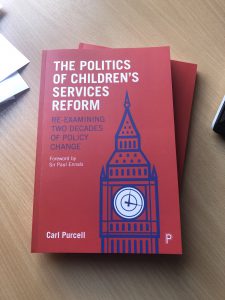 Dr Carl Purcell, NIHR Health and Social Care Workforce Research Unit, King’s College London. His book, The Politics of Children’s Services Reform: Re-examining Two Decades of Policy Change, is just out. (849 words)
Dr Carl Purcell, NIHR Health and Social Care Workforce Research Unit, King’s College London. His book, The Politics of Children’s Services Reform: Re-examining Two Decades of Policy Change, is just out. (849 words)
As we emerge from the current crisis, we must rethink how we resource and deliver child and family welfare services. The incredible contribution made by everybody working in the NHS is now widely appreciated. But we must remember that there are many others working to protect the most vulnerable in our society who also deserve our recognition. Furthermore, as we move, tentatively, towards easing the lockdown the skills, knowledge and dedication of teachers, childcare workers and social workers, to name just a few, will be vital to ensuring that we are able to identify and support the most vulnerable children and families.
 However, as we place greater demands on schools, local authorities and a vast array of voluntary sector agencies we must recognise that before the current crisis our child and family welfare system was already under significant strain. In my new book I reflect upon recent national policy developments to help explain how we arrived in this position. As we chart a way forward, three aspects of the contemporary system need to be addressed.
However, as we place greater demands on schools, local authorities and a vast array of voluntary sector agencies we must recognise that before the current crisis our child and family welfare system was already under significant strain. In my new book I reflect upon recent national policy developments to help explain how we arrived in this position. As we chart a way forward, three aspects of the contemporary system need to be addressed.
First, we need to reconsider the extent to which, and how, we provide financial assistance to those who need it most. Since 2010 welfare payments and tax breaks offered to the poorest families have been reduced or withdrawn. Progress made in reducing child poverty over the preceding decade has been reversed, with over 4 million children now living in poverty, many of them in working households (Joseph Rowntree Foundation, 2018). Moreover, the current crisis has demonstrated how precarious and insecure many people’s jobs are, and we have seen record increases in benefit claims. Many more families have been pushed beneath the poverty line.
Second, more resources are needed to fund the child and family welfare services we need to help us identify and support the most vulnerable children and families. In response to rising demand and declining budgets, local authorities have been forced to prioritise spending on specialist children’s social care services over the last decade to ensure that they can respond to the most serious cases of child abuse and neglect. But this has meant that funding for universal ‘early intervention’ services such as children’s centres and youth services has been almost cut in half (Action for Children et al 2019). Our capacity to identify and respond to families most in need of support, and before more draconian interventions are necessary, is greatly diminished at a time when it is needed most.
Third, it is imperative that the design and delivery of services must involve those who lead welfare agencies, those working on the frontline, and children and families themselves. They are best placed to understand what is needed and to advise on how we can make best use of the resources available. Recent reforms to children’s services have been too top-down and have tended to view organisational restructuring as a magic bullet. Labour’s Every Child Matters programme required the break-up of social services departments and the creation of new children’s services departments in every local authority. More recently, Conservative ministers have promoted the outsourcing of children’s social care services in response to apparent ‘failings’ at the local level. In both cases concerns raised by those working in the sector were largely ignored, and valuable resources have been diverted. Yet bold promises made by ministers to fix the system are never delivered.
If we look further back to the development of the Children Act 1989, which continues to provide the legal cornerstone for child and family welfare services even after three decades of subsequent reform, valuable lessons can be learned. This legislation, developed under a Conservative Government, involved extensive research involving those working to support children and families, supported but not micro-manged by central government. Going forward, we must pool our resources and ensure that government policymakers, researchers and those working directly with children and families all pull in the same direction.
Carl Purcell (2020) The Politics of Children’s Services Reform: Re-examining Two Decades of Policy Change (Bristol, Policy Press) is published on 29 April 2020.
Reviews
 “Erudite and relevant to all immersed in helping children and families. It gives a riveting account of developments and debates and describes the journey which has created the context for today’s children’s services. An impressive book that will have currency well into the future.” Ray Jones, Kingston University and St George’s, University of London
“Erudite and relevant to all immersed in helping children and families. It gives a riveting account of developments and debates and describes the journey which has created the context for today’s children’s services. An impressive book that will have currency well into the future.” Ray Jones, Kingston University and St George’s, University of London
“This book is a ‘must read’ for anyone interested in recent child welfare policy. Drawing on an impressive range of high level interviewees, Purcell provides a readable and coherent account of child welfare policy making with valuable insights that illuminate the contemporary situation.” Nick Frost, Leeds Beckett University
References
Action for Children, National Children’s Bureau, NSPCC (National Society for the Prevention of Cruelty to Children), The Children’s Society and Barnardo’s (2019) ‘Children and young people’s services: funding and spending 2010/ 11 to 2017/ 18’.
Joseph Rowntree Foundation (2018) ‘UK poverty 2018’.